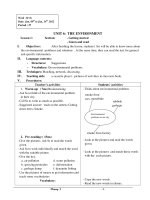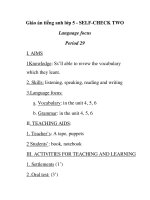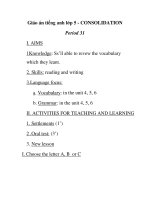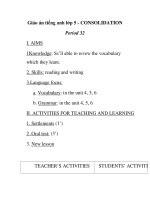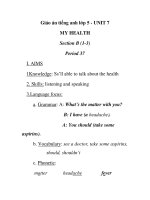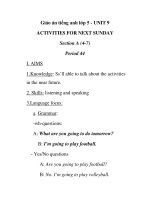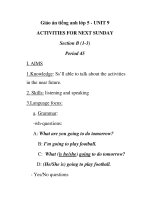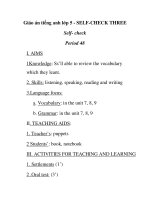- Trang chủ >>
- Mầm non - Tiểu học >>
- Lớp 5
giáo án tiếng anh lớp 5 học kỳ i
Bạn đang xem bản rút gọn của tài liệu. Xem và tải ngay bản đầy đủ của tài liệu tại đây (1.06 MB, 108 trang )
ME AND MY FRIENDS
Week: 1. Date of teaching: Thursday, September 12
th
, 2013.
Period: 1
st
.
UNIT 1:
A SUMMER CAMP
Lesson 1
========================================================================
I. Objectives:
- By the end of this lesson, students will be able to ask and answer questions about
where some is from.
- Develop speaking skill.
II. Teaching methods:
- Communicative approach.
- Techniques:
+ Ask and answer (say individually)
+ Work in pairs/ groups.
+ Discuss.
III. Teaching aids:
- Teacher’s aids: student’s and teacher’s book, word cards, pictures, tape, cassette,
puppets.
- Students’ aids: books, notebooks, workbooks.
IV. Languages focus:
- Vocabulary: summer, camp, different, country( countries), Malaysia – Kuala
Lumpur , Thailand – Bangkok, the USA – New York, Indonesia - Jakarta
- Structures:
A: Where’s he from?
B: He’s from Malaysia.
A: Where in Malaysia is he from?
B: Kuala Lumpur.
V. Procedures:
Time Steps/Activities
Work
arrangement
6’
10’
I. Warm up: Slap the board.
Let Ss play the game with the characters in character gallery
on P.2
II. New lesson
1. Look, listen and repeat.
- Have Ss to look at the book at page 6 and get Ss to
identify the familiar characters and the new ones.
- Have Ss guess what is happening in each picture.
- Set the scene: These children are at a summer camp in
Vietnam.(elicit the word “summer camp”)
T – whole
class
T – Whole
class
========================================================================
10’
- Use the world map to show where each country or city is
(Malaysia, Thailand, Bangkok and Kuala Lumpur)
- Write the new words on the board and get Ss to read a
few times.
- Have Ss listen to the recording as they read the lines in
the speech bubbles
- Play the recording again for Ss to repeat the lines in the
speech bubbles two times.
- Divide the class into groups to take turns to say the lines
from Zack and Lawan.
- Play the recording again for the whole class to repeat
each line in the speech bubbles to reinforce their
pronunciation.
2. Point, ask and answer.
- Have Ss look at the pictures a, b, c and d on page 6
- Set the context: These children come from many
countries.
Point to P. a and say: This is Zack. He’s from
Kuala Lumpur, Malaysia. – Have Ss repeat: Zack,
Malaysia, Kuala Lumpur.
Repeat the step with other pictures.
- Ask Ss to read the example and elicit their prompts to
complete the text in the speech bubbles
- Write the questions and answer on the board and get Ss
to repeat the lines a few times in turn.
- Model the task.
Point to Zack and ask: Where’s he from?
Class: He’s from Malaysia
T: Where in Malaysia is he from?
Class: Kuala Lumpur.
- Ask them to act out the dialogue. Repeat the step with
some other pairs for pictures b, c, d.( Focus on
pronunciation and fluency)
- Have Ss practice acting out the dialogue in pairs, using
the pictures.
- Monitor the activity and offer help. Correct
Group/ pair
work
T – Whole
class
T – Whole
class
Group work
Pair- work
========================================================================
10’
4’
pronunciation errors (stress, assimilation of sounds,
intonation) when necessary.
- Call on some pairs to perform the task at the front of the
class.
- Have the whole class repeat all the phrases in chorus to
reinforce their pronunciation.
3. Listen and tick.
- Get Ss to look at the pictures on page 7 and tell them the
purpose of the listening.
- Elicit the information of these pictures.
- Do the first example with Ss.
- Play the recording twice: once for listening all the way
through and once for them to doing the task.
- Play it again for Ss to check their answer
- Ss trade their answers within pairs or groups for
correction
- Ask Ss to report the answers aloud to the class. The
others listen and give comments.
- Make some questions to check Ss’ comprehension
III. Summary and Home- link:
- Consolidate the content of the lesson.
- Ask Ss search for the cities and flags of related countries
in the unit on the world map or in the internet.
T – whole
class
T – whole
class
Individually
Pair- work
T – whole
class
Week: 1 Date of teaching: Friday, September 13
th
, 2013.
Period: 2
nd
.
UNIT 1:
A SUMMER CAMP
Lesson 2
I. Objectives:
- By the end of this lesson, Students will be able to pronounce correctly the sound of the
letter “ese” and that of the letter “ian”; listen and read for specific information
- Develop listening, speaking and reading skills.
II. Teaching methods:
- Communicative method.
========================================================================
- Techniques: + Work in pairs
+ Work in groups, discuss.
III. Teaching aids:
- Teacher’s aids: Tape cassette, pictures, poster, word cards.
- Students’ aids: book, notebook, workbook.
IV. Languages focus:
* Phonics: Vietnamese Indonesian
V. Procedures:
Warm up: Country bingo
Let Ss play the game with the grid and a list of countries
Vietnam Laos Indonesia
Malaysia Thailand The USA
The UK Korea Cambodia
I. New lesson
1. Listen and repeat/ Group and say it aloud.
a. Listen and repeat.
- Have Ss open the book page 8, draw their attention to the
letters colored differently in the words Vietnamese and
Indonesian
- Set the scene: “We are going to learn how to produce
the sound of letters ese in the word Vietnamese and that
of the letter ian in the word Indonesian”
- Produce the sound of the letter ese and ian a few times
- Get Ss to repeat the words a few times.
- Encourage Ss to recall the names of countries (Unit 2 –
Tieng Anh 4) which have the end of ese and ian
b. Group and say it aloud
- Ask Ss to look at the chart and the word box
- Check if they understand the activity and the meaning of
the focused words.
- Say each word and get Ss to repeat a few times.
- Set the time and let Ss do the task
========================================================================
- Ss check their answer in pairs.
- Call some Ss to report their answers to the class
- Have the whole class read in chorus all the words in each
column.
2. Listen and read together.
- Have Ss look at Picture a and b on Page 8 and set the
context.
- Pre-teach the new vocabulary (write new words on the
board and get Ss to repeat them a few times)
• cultural show
• mask
• model
• twin towers
- Read each dialogue, stop at times to check Ss’
comprehension.
- Have Ss repeat each line in the dialogues (clap once for
the words with “ese” and clap twice for the words with
ian
- Model and get Ss to clap in the same way then repeat
each line of the dialogues.
- Play the recording twice: once for Ss to listen all the way
through and once for them to clap at the focused words.
- Device the class into four groups to take turns to repeat
the lines from Mai, Akio, Azmi and Zack.
3. Listen and number.
- Ask Ss to look at Picture a, b, c and d on page 9
- Set the scene: “you are going to listen to the recording
and number the picture”
- Elicit the content from Ss:
What’s it?
P.a: a robotic cat – Doraemon.
P.b: the Petronas Twin Towers in Malaysia.
P.c: 3 Indonesian masks.
========================================================================
Using pictures or
translating
P.d: a Chinese lantern.
- Pre-teach the key words: (Write the words on the board
Ss repeat a few times)
• activity
• talk
• display
• Doraemon.
- Play the recording twice: once for Ss to listen all the way
through, once for them to do the task.
- Play it again for Ss to check their answers.
- Have Ss trade their answers in pairs for correction
- Call some to report their answer to the class
Answer: 1 – c 2 – d 3 – b 4 – a
II. Summary and Home- link:
- Consolidate the content of the lesson.
- Ask Ss select a favourite flag, draw and colour it at home
for a class display in the next lesson.
Week: 2 Date of teaching: Thursday, September 19
th
, 2013
Period: 3
rd
UNIT 1
A SUMMER CAMP
Lesson 3
I. Objectives:
- By the end of this lesson, Students will be able to:
• Ask and answer about someone’s nationality
• Read an information text on a summer camp and write an e-mail.
- Develop speaking and listening skill.
II. Teaching methods:
- Communicative method.
- Techniques: + Work in pairs
+ Work in groups, discuss.
+ Ask and answer.
========================================================================
III. Teaching aids:
- Teacher’s aids: audio CD, pictures, poster, flashcards.
- Students’ aids: book, notebook, workbook.
IV. Language focus:
Vocabulary: stage, nationality
Sentence Patterns: What’s his/ her nationality?
He’s/ She’s ………………………
V. Procedures:
Time Steps/Activities
Work
arrangement
6’
10’
10’
I. Warm up:
- Let Ss display their flags and play the game Pelmalism
using names of countries and nationalities.
II. New lesson.
1. Look, listen and repeat.
- Have Ss to look at the book at page 10.
- Set the context: This is a cultural activity at the summer
camp.
• Ask Ss to look at the P. a and ask (Who are
they?, Who are these children talking about?,
What’ s the name of the boy on the stage?,
What’s his nationality?)
• Repeat the step with P.b
- Pre-teach: stage, nationality(Write the words on the
board and ask Ss to repeat a few times)
- Play the recording all the way through for Ss to listen
the dialogue.
- Play the recording again for Ss to repeat each line of the
dialogue a few times.
- Divide the class into groups to take turns to say the
questions and answers in each line.
2. Point, ask and answer.
- Draw a chart of the country and nationality related to
this section on the board and get Ss to repeat each name
a few times.
T – whole
class
T – whole
class
Whole class
Individually
Groups
T – whole
class
========================================================================
10’
- Set the scene: These children are at the summer camp.
They’re from different countries. Now you practice
asking and answering questions about their
nationalities.
- Ask Ss to read the example and elicit their prompts to
complete the speech bubbles (write the question and
answer on the board and ask Ss to repeat a few times)
- T models:
Point to Pa. and ask What’s his nationality Ss:
He’s Malaysian.
Repeat the step with picture b, c and d.
- Have Ss to practice in pairs pointing, asking and
answering
- Monitor the activity, check the pronunciation (sound,
assimilation of sound and intonation) and offer help
when necessary.
- Call on some pairs to perform the task at the front of the
class. Others observe and comment.
- Have the whole class repeat the question and answer in
chorus to reinforce their pronunciation.
3. Read and do the tasks .(Choose one of 3 or 4)
a. Tick T (True) or F (False)
- Ask Ss to look at the picture on P.11
- Set the context:
• Can you guess what you are going to read about?
• Where is it?
• What are the children doing?
- Elicit and recall any vocabulary that Ss will need to
understand the text(Write the words on the board and
Ss repeat a few times)
- Play the recording, pause at times to check Ss’
comprehension.
- Check if Ss understand the task. Do the first for example
- Give Ss sufficient time to do the task and move around
to monitor the activity.
- Have Ss to check their answers in pairs before call some
Pair – work
T – whole
class
T – whole
class
Individually
Pair – work/
Group work
Whole class
========================================================================
10’
5’
Ss to report the answer to the class.
b. For the better Ss)
- Ask Ss to brainstorm the s; ate different kinds of food
and drink; ect.
- Encourage Ss to talk about one thing they liked doing
and one thing that they did not like.
- Set time and get Ss to work in pairs. Monitor the
activity
- Call on some individual students to say their answers to
the class.
4. Read and write an e – mail. (Choose one of 3
or 4)
- Get Ss to look at the example e - mail and have a brief
discussion with the class about the picture and the task.
- Point to the model text and elicit Ss’ answer: Who wrote
the e-mail?; Who will receive it?;
- Read the passage and check Ss’ comprehension: Where
was the summer camp? What did the campers do at the
camp? …
- Get Ss to read the model e-mail and read the guide
- Let Ss do the task. Move around the class to monitor the
activity.
- Get a few Ss to read aloud their e-mail to the class.
- Have a class display of Ss’ work.
III. Summary and Homelink.
- Ss have learnt
• To ask and answer about someone’s nationality,
using What’s his/ her nationality? – He’s/ She’s
Indonesian.
• To read about the summer camp and write an e-
mail to a friend
- Encourage Ss to play the City/ Country Bingo and sing
along the song Jenny and Harry at home.
T – whole
class
Pair work
T – whole
class
Individually
Whole class
T – whole
class
Week: 2 Date of teaching: Friday, September 20
th
, 2013
========================================================================
Period: 4
th
UNIT 2
MY FRIEND’S HOUSE
Lesson 1
I. Objectives:
- By the end of this lesson, students will be able to ask and answer questions about
where one lives.
- Develop speaking skill.
II. Teaching methods:
- Communicative approach.
- Techniques:
+ Ask and answer (say individually)
+ Work in pairs/ groups.
+ Discuss.
III. Teaching aids:
- Teacher’s aids: student’s and teacher’s book, word cards, pictures, tape, cassette,
puppets.
- Students’ aids: books, notebooks, workbooks.
IV. Languages focus:
- Vocabulary: same area, street, floor, building.
- Structures:
A: Where do you live?
B: I live at 52 Ba Trieu Street.
o I live on the second floor of Ha Noi Tower.
V. Procedures:
Time Steps/Activities
Work
arrangement
6’
10’
I. Warm up: Number Bingo.
Let Ss play the game with numbers 21 – 50.
II. New lesson
1. Look, listen and repeat.
- Have Ss to look at the book at page 6 and get Ss to identify the
characters in each picture.
- Have Ss guess what is happening in each picture: Who is
T – whole
class
T – Whole
class
========================================================================
10’
this?; What’s his/her name?; Where are they?;
- Pre-teach the vocabulary(Write the words on the board and
ask Ss to repeat a few times)
• same area
• street
• floor
• Tower
- Have Ss listen to the recording as they read the lines in the
speech bubbles
- Play the recording again for Ss to repeat the lines in the speech
bubbles two times.
- Divide the class into groups to take turns to say the lines of
Mai and Tony.
2. Point, ask and answer.
- Have Ss look at the pictures a, b, c and d on page 13
- Set the context: We are going to ask and answering about the
addresses.
- Ask Ss to pretend to be Mai and Tony. Read the line in speech
bubbles and elicit Ss’ prompts to complete the lines.
- Write the questions and answers on the board and get Ss to
repeat a few times.
- Pre-teach the vocabulary:
• avenue
• road
• lane
• numbers: 74, 51, 72
- model the task
Point to P. a and ask: Where do you live? –Ss: I live in
the 2
nd
floor of Ha Noi Tower.
Repeat the step with other pictures.
- Have Ss to take turns to point to the pictures , ask and answer
about addresses.
- Monitor the activity and offer help. Correct pronunciation
errors (stress, assimilation of sounds, intonation) when
necessary.
- Call on some pairs to perform the task at the front of the class.
Pair work
Group
T – Whole
class
Pair- work
========================================================================
10’
4’
- Have the whole class repeat all the phrases in chorus to
reinforce their pronunciation.
3. Listen and match.
- Get Ss to look at the pictures on page 7 and tell them the
purpose of the listening.
- Elicit the information of these pictures. Have Ss to repeat the
characters’ names
- Have Ss repeat the numbers: 38, 52, 26, 73
- Do the first example with Ss.
- Play the recording twice: once for listening all the way
through and once for them to doing the task.
- Play it again for Ss to check their answer
- Ss trade their answers within pairs or groups for correction
- Ask Ss to report the answers aloud to the class. The others
listen and give comments.
- Make some questions to check Ss’ comprehension
III. Summary and Home- link:
- In this lesson, Ss have learnt to ask and answer questions
about where one lives, using Where do you live? – I live at/ on
___________.
- Encourage Ss to draw his/ her house and writes the address
under the picture for the class display in the next lesson.
T – whole
class
T – whole
class
Individually
Pair- work
T – whole
class
Week: 3 Date of teaching: Thursday, September 26
th
, 2013.
Period: 5
th
UNIT 2:
MY FRIEND’S HOUSE
Lesson 2
I. Objectives:
- By the end of this lesson, Students will be able to pronounce correctly the sound of the
letter “fl” as in flat and that of the letter “bl” as in block; listen and number the
pictures in the order they hear
- Develop listening, speaking and reading skills.
II. Teaching methods:
========================================================================
- Communicative method.
- Techniques: + Work in pairs
+ Work in groups, discuss.
III. Teaching aids:
- Teacher’s aids: Tape cassette, pictures, poster, word cards.
- Students’ aids: book, notebook, workbook.
IV. Languages focus:
* Phonics: flat block
V. Procedures:
Time Steps/Activities
Work
arrangement
5’
5’
7’
I. Warm up: Students’ display
Let Ss display their drawings on the board. Then ask and
answer questions related to the addresses.
II. New lesson
- Listen and repeat/ Listen, complete and say
aloud.
a. Listen and repeat.
- Have Ss open the book page 8, draw their attention to
the letters colored differently in the words flat and block
- Set the scene: “We are going to learn how to produce
the sound of letters fl in the word flat and that of the
letter bl in the word block”
- Produce the sound of the letter fl and bl a few times
- Get Ss to repeat the words a few times.
- Encourage Ss to recall the names of countries (Unit 2 –
Tieng Anh 4) which have the end of ese and ian
b. Listen, complete and say aloud.
- Ask Ss to look at the book at P.15
- Check if they understand the activity and the meaning of
the focused words.
- Get Ss to guess all the complete words and do the first
example
- Set the time and let Ss do the task
T – whole
class
T – Whole
class
Individually
Pair – work
T – whole
class
T – whole
class
========================================================================
10’
10’
- Ss check their answer in pairs.
- Call some Ss to report their answers to the class
- Have the whole class read in chorus all the words in
each column.
- Listen and read together.
- Have Ss look at Picture a and b on Page 15 and ask them
to identify the characters and the focused words.
- Set the context:Nga and her friends live in the same
blocks of flats. They live on different floors.
- Pre-teach the new vocabulary (write new words on the
board and get Ss to repeat them a few times)
• top
• fourth
• third
• ground floor
- Ask Ss to guess what the passage is about.
- Read the passage, stop at times to check Ss’
comprehension.
- Have Ss repeat each line in the passage (clap once for
the words with “fl” and clap twice for the words with
“bl”
- Model and get Ss to clap in the same way then repeat
each line of the dialogues.
- Play the recording twice: once for Ss to listen all the way
through and once for them to clap at the focused words.
- Listen and number.
- Ask Ss to look at Picture a, b, c and d on page 16
- Set the scene: “You are going to listen to the recording
and number the pictures”
- Elicit the content from Ss:
Where does this girl/ boy live?
- Write the addresses (location words and number) on the
board and get Ss to repeat them a few times.
- Play the recording twice: once for Ss to listen all the way
T – whole
class
Individually
Group
T – whole
class
T – whole
class
Individually
========================================================================
Using pictures or
translating
3’
through, once for them to do the task.
- Play it again for Ss to check their answers.
- Have Ss trade their answers in pairs for correction
- Call some to report their answer to the class
Answer: 1 – b 2 – d 3 – a 4 – e 5 – c
III. Summary and Home- link:
- Consolidate the content of the lesson.
- Ss make sentences with the words from the crossword
puzzle for the class display in the next lesson.
Pair- work
T – whole
class
T – whole
class
Week: 3 Date of teaching: Friday, September 27
th
, 2013
Period: 6
th
UNIT 2
MY FRIEND’S HOUSE
Lesson 3
I. Objectives:
- By the end of this lesson, Students will be able to:
• Ask and answer about a friend’s house
• Read a description of a house
• Write about a friend’s house.
- Develop speaking and listening skill.
II. Teaching methods:
- Communicative method.
- Techniques: + Work in pairs
+ Work in groups, discuss.
+ Ask and answer.
III. Teaching aids:
- Teacher’s aids: audio CD, pictures, poster, flashcards.
- Students’ aids: book, notebook, workbook.
IV. Language focus:
Vocabulary: great, cottage, yard, pond, roof, balcony, large, comfortable, fence,
violet,
========================================================================
Sentence Patterns: What’s your house like?
It’s a big house. It’s got a green gate.
V. Procedures:
Time Steps/Activities
Work
arrangement
6’
10’
10’
I. Warm up:
II. New lesson.
1. Look, listen and repeat.
- Have Ss to look at the book at page 17, read the context
sentence above the pictures and identify the characters
in the pictures
- Set the context:
• Ask Ss to look at the P. a and ask (What are Mai
doing?, Who’s asking her?
• Repeat the step with P. b:What colour is Mai’s
house? Is it small/ big?
- Pre-teach: great, what… like? (Write the words on the
board and ask Ss to repeat a few times)
- Play the recording all the way through for Ss to listen
the dialogue.
- Play the recording again for Ss to repeat each line of the
dialogue a few times.
- Divide the class into groups to take turns to say the
questions and answers in each line.
2. Point, ask and answer.
- Draw Ss’ attention to the picture next to the example in
this section
- Set the scene: imagine this is your house. We’re going
to ask and answer about your house.
- Ask Ss to read the example and elicit their prompts to
complete the speech bubbles (write the question and
answer on the board and ask Ss to repeat a few times)
- Pre-teach the new vocabulary:
• cottage
T – whole
class
T – whole
class
Whole class
Individually
Groups
T – whole
class
========================================================================
10’
• yard
• pond
• roof
• balcony
• large
- Get Ss to repeat the prompt under each picture a few
time and make sure they understand them.
- T models the task:
Point to Pa. and ask What’s your house like? Ss:
It’s a large cottage. It’s got a large pond.
Repeat the step with picture b, c and d.
- Have Ss to practice in pairs pointing, asking and
answering
- Monitor the activity, check the pronunciation (sound,
assimilation of sound and intonation) and offer help
when necessary.
- Call on some pairs to perform the task at the front of the
class. Others observe and comment.
- Have the whole class repeat the question and answer in
chorus to reinforce their pronunciation.
3. Read and tick the right picture .(Choose one
of 3 or 4)
- Ask Ss to look at the picture on P.11 and read the title
and instruction.
- Set the context: you are going to read the passage and
tick the right picture
- Elicit and recall any vocabulary that Ss will need to
understand the text: comfortable, fence, violet, go fishing
(Write the words on the board and Ss repeat a few times)
- Play the recording, pause at times to check Ss’
comprehension.
- Check if Ss understand the task. Do the first for example
- Give Ss sufficient time to do the task and move around to
monitor the activity.
- Have Ss to check their answers in pairs before call some
Ss to report the answer to the class.
Pair – work
T – whole
class
T – whole
class
Individually
Pair – work/
Group work
Whole class
========================================================================
Using pictures or drawing/
gestures
10’
5’
4. Write about your friend’s house. (Choose one
of 3 or 4)
- Get Ss to look at the passage and have a brief discussion
with the class about the picture and the task.
- Tell them the writing purpose: they are going to read the
description of one’s friend’s house and choose the
appropriate words from the box to complete the passage.
- Set the time and let Ss do the task. Move around the class
to monitor the activity.
- Get a few Ss to read aloud their writing to the class.
III. Summary and Home-link.
- Consolidate the content of the lesson.
- Encourage Ss to finish their drawing for the class
display in the next lesson.
T – whole
class
Individually
Whole class
T – whole
class
Week: 5 Date of teaching: Thursday, October 10
th
, 2013
Period: 9
th
UNIT 3
A BIRTHDAY PARTY
Lesson 3
I. Objectives:
- By the end of this lesson, Students will be able to:
• Ask and answer about a friend’s house
• Read a description of a house
• Write about a friend’s house.
- Develop speaking and listening skill.
II. Teaching methods:
- Communicative method.
- Techniques: + Work in pairs
+ Work in groups, discuss.
+ Ask and answer.
III. Teaching aids:
- Teacher’s aids: audio CD, pictures, poster, flashcards.
- Students’ aids: book, notebook, workbook.
IV. Language focus:
Vocabulary: review
========================================================================
Sentence Patterns: What did you do at the party?
o We played hide – and - seek.
V. Procedures:
Time Steps/Activities
Work
arrangement
6’
10’
10’
I. Warm up:
Ss sing along the song Happy birthday.
II. New lesson.
1. Look, listen and repeat.
- Have Ss to look at the book at page 20, get Ss to look at
the pictures and set the context: Nam went to Tony’s
birthday. Now his sister Hoa is sking him what they did
at the party.
- Read each exchange, stop at times to check Ss’
comprehension.
- Make sure that Ss can understand the situation and
language in each picture
- Play the recording all the way through for Ss to listen
the dialogue.
- Play the recording again for Ss to repeat each line of the
dialogue a few times.
- Divide the class into groups to take turns to say the
questions and answers in each line.
2. Point, ask and answer.
- Ask Ss to open the book on page 24. Draw Ss’ attention
to the picture next to the example in this section
- Set the scene: Imagine you are Nam. You went to a
birthday party with these children.
- Ask Ss to read the example and elicit their prompts to
complete the speech bubbles (write the question and
answer on the board and ask Ss to repeat a few times)
- Get Ss to repeat the prompt under each picture a few
times and make sure they understand them.
- T models the task:
Point to Pa. and ask What did you do at the party?
T – whole
class
T – whole
class
Whole class
Individually
Groups
T – whole
class
========================================================================
10’
10’
Ss: We danced.
Repeat the step with picture b, c and d.
- Have Ss to practice in pairs pointing, asking and
answering
- Monitor the activity, check the pronunciation (sound,
assimilation of sound and intonation) and offer help
when necessary.
- Call on some pairs to perform the task at the front of the
class. Others observe and comment.
- Have the whole class repeat the question and answer in
chorus to reinforce their pronunciation.
3. Read and answer .(Choose one of 3 or 4)
- Ask Ss to look at the picture on P.25 and read the title
and instruction.
- Set the context: You’ve got two invitation cards: one
from Lan Huong and one from Peter Brown. Look at the
invitation cards and find the answers to these
questions(point to the questions)
- Read each line on the invitation cards, pausing at times to
check Ss’ comprehension, using the questions provided
- Elicit and recall any vocabulary that Ss will need to
understand the text: cordially, invited, celebration,
celebrating (Write the words on the board and Ss repeat
a few times)
- Read the cards again and get Ss to repeat each line a few
times.
- Ss take turns to ask and answer the questions
- Call some pairs to report the answer to the class.
4. Write an invitation card. (Choose one of 3 or
4)
- Set the context: You are going to write your birthday
invitation card. Read each line. Do you understand what
it say? What should you write?
- Call on a few Ss and elecit their prompts to fill in the
card. Write a model on the board. Read each line and get
Ss to repeat a few times.
Pair – work
T – whole
class
T – whole
class
Individually
Pair – work/
Group work
Whole class
T – whole
class
Individually
Whole class
========================================================================
5’
- Set the time and let Ss do the task. Move around the class
to monitor the activity.
- Get a few Ss to read aloud their writing to the class.
III. Summary and Home-link.
- Consolidate the content of the lesson.
- Encourage Ss to practice singing their own version of
the song Happy Birthday at home.
T – whole
class
Week: 5 Date of teaching: Friday, October 11
th
, 2013
Period: 10
th
UNIT 4
MAI’S DAY
Lesson 1
I. Objectives:
- By the end of this lesson, students will be able to ask and answer questions about
someone’s daily activities.
- Develop speaking skill.
II. Teaching methods:
- Communicative approach.
- Techniques:
+ Ask and answer (say individually)
+ Work in pairs/ groups.
+ Discuss.
III. Teaching aids:
- Teacher’s aids: student’s and teacher’s book, word cards, pictures, tape, cassette,
puppets.
- Students’ aids: books, notebooks, workbooks.
IV. Languages focus:
- Vocabulary: have got classes, do morning exercise, have PE in the gym
- Structures:
A: What does she often do in the morning?
B: She’s got classes at school.
V. Procedures:
========================================================================
Time Steps/Activities
Work
arrangement
6’
10’
10’
I. Warm up: Simon says
Let Ss play the game with the word phrase: put up your hands, put
down your hands, clap your hands, stand up, sit down, open your
book, close your book….
II. New lesson
1. Look, listen and repeat.
- Have Ss to look at the book on page 27 and get Ss to look at
the title of the unit and the picture.
- Elicit their answers to identify the people in each picture: Who
is this?/ Who’s this boy/ girl?
- Recall the familiar vocabulary and pre-teach the
vocabulary(Write the words on the board and ask Ss to repeat
a few times)
• have got classes
• has got classes
- Set the context: Linda’s asking Phong what Mai, his sister,
often does in the morning. He said that Mai has got classes at
school. Now listen to Mai talking about what she often does in
the morning/ afternoon/ evening.
- Have Ss listen to the recording as they read the lines in the
speech bubbles
- Play the recording again for Ss to repeat the lines in the speech
bubbles two times.
- Divide the class into groups to take turns to say the lines of
Mai and Tony.
2. Point, ask and answer.
- Have Ss look at the pictures a, b, c and d on page 27
- Set the context: You are asking your partner about these
characters’ daily activities from P.a to P.e.
- Ask Ss to Read the line in speech bubbles and elicit Ss’
prompts to complete the lines.
- Write the questions and answers on the board and get Ss to
repeat a few times.
- Recall the familiar vocabulary and pre-teach the vocabulary:
T – whole
class
T – Whole
class
Pair work
Group
T – Whole
class
========================================================================
10’
4’
• gym
• morning exercise
- Model the task
Point to P. a and ask: What does she often do in the
morning? –Ss: She’s got classes at school.
Repeat the step with other pictures.
- Have Ss to take turns to point to the pictures, ask and answer
about addresses.
- Monitor the activity and offer help. Correct pronunciation
errors (stress, assimilation of sounds, intonation) when
necessary.
- Call on some pairs to perform the task at the front of the class.
- Have the whole class repeat all the phrases in chorus to
reinforce their pronunciation.
3. Listen and tick.
- Get Ss to look at the pictures on page 28 and tell them the
purpose of the listening: You are going to hear Mary, an
Australian girl, talking about her daily activities. You should
read each sentence in your book, listen and tick the
appropriate picture for what Mary does.
- Have Ss to read each sentence and guess the picture to tick.
- Do the first example with Ss.
- Play the recording twice: once for listening all the way
through and once for them to doing the task.
- Play it again for Ss to check their answer
- Ss trade their answers within pairs or groups for correction
- Ask Ss to report the answers aloud to the class. The others
listen and give comments.
- Make some questions to check Ss’ comprehension
III. Summary and Home- link:
- In this lesson, Ss have learnt to ask and answer questions
about someone’s daily activities, using What does he/she often
do in the morning? - He/ She ………………
- Encourage Ss to make a list of their daily activities for the
class display.
Pair- work
T – whole
class
T – whole
class
Individually
Pair- work
T – whole
class
========================================================================
Week: 6 Date of teaching: Thursday, October 17
th
, 2013.
Period: 11
th
UNIT 4:
MAI’S DAY
Lesson 2
I. Objectives:
- By the end of this lesson, Students will be able to pronounce correctly the sound of the
letter “oo” as in afternoon and that of the letter “br” as in brush; listen and number
the pictures in the order they hear
- Develop listening, speaking and reading skills.
II. Teaching methods:
- Communicative method.
- Techniques: + Work in pairs
+ Work in groups, discuss.
III. Teaching aids:
- Teacher’s aids: Tape cassette, pictures, poster, word cards.
- Students’ aids: book, notebook, workbook.
IV. Languages focus:
Phonics: afternoon brush
V. Procedures:
Time Steps/Activities
Work
arrangement
5’
5’
I. Warm up: Students’ display
Let Ss display their home-link writing. Then ask and answer
questions related to the items on the list.
II. New lesson
1. Listen and repeat/ Group and say aloud
a. Listen and repeat.
- Have Ss open the book page 29, draw their attention to
the letters colored differently in the words aftern oo n and
brush
- Set the scene: “We are going to learn how to produce
the sound of letters oo in the word aftern oo n and that of
the letter br in the word brush”
T – whole
class
T – Whole
class
Individually
========================================================================


